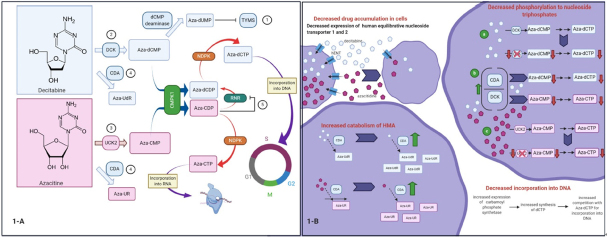Figure 1.
Proposed mechanisms of auto-resistance to hypomethylating agents[35]. A: mechanisms related to changes in nucleoside metabolism: (1) decitabine inhibits thymidylate synthase (TYMS). As a consequence dTTP levels decrease and dCTP levels increase. This is associated with a (2) decrease in deoxycytidine kinase (DCK), (3) increase in uridine/cytidine kinase 2 (UCK2), and (4) increase in cytidine deaminase (CDA). Alternatively, azacitidine is metabolized to aza-CDP, which (5) inhibits ribonucleotide reductase (RRM1). Inhibition of ribonucleotide reductase diminishes the conversion of aza-CDP to aza-dCDP and eventually aza-dCTP, which is capable of depleting DNMT1. In addition, dCTP levels decrease and, subsequently, (2, 4) DCK and CDA increase while (3) UCK2 decreases, which in turn decreases the conversion of azacitidine to aza-CMP; B: additional mechanisms of resistance. Decreased expression of human equilibrative nucleoside transporter (hENT) 1 and 2 is associated with decreased intracellular accumulation of decitabine and azacitidine. Although not a universal finding, a possible mechanism of resistance in MDS is an increase in carbamoyl-phosphate synthetase (CAD) expression, resulting in increased synthesis of dCTP, which competes with aza-dCTP for incorporation into DNA. CMPK: cytosine nucleoside monophosphate kinase; RNR: ribonucleotide reductase; NDPK: nucleoside diphosphate kinase. Figure was created with BioRender

